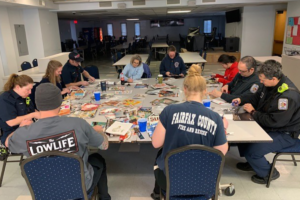By Kathy Hurt
If you or someone you love is having thoughts of suicide, please call the National Suicide Prevention Lifeline at 988 to connect with a trained crisis counselor.
As a church pastor, I prepare sermons every week that will (hopefully) help people live well and love fully. I have found that including stories from my own life experiences seems to resonate most with my listeners. They tell me that when I talk about myself, they feel as though “you were talking about me.” I always enjoy hearing such feedback—except when it is spoken in a low voice, almost a whisper, and comes with a knowing look or an especially strong hug.
That is the response I receive exclusively when I talk about my depression.
Twice in my life, I have fallen into an extended bout of depression, which has required hospitalization, medication, shock treatments, lots of therapy and time off work. My depression comes with persistent thoughts of suicide, and I have attempted suicide more than once. Recovery is never quick: My first depressive episode required a two-year stay in a psychiatric hospital for me to feel functional once again, while the second depression hung over me for nearly three years. With each occurrence, I believed I would never know joy again, would never be able to work and might so tire the patience of my family and friends that they would give up on me—not to mention the fact that I gave up on myself at least five times a day.
Yet I recovered—not just to a small degree, but fully. Today, I serve a large congregation and have recently published a memoir about my first depressive episode. My motivation for writing that story is the same motivation that inspires me to speak about depression in my sermons: I am committed to push back against the stigma that is still attached to mental illness.
Such a resolve—not only to not be cowed by stigma but to resist it—did not come easily to me. I often found myself believing some of the negative messages that accompany stigma—messages that told me I was not depressed but simply weak-willed or lazy, messages that shamed me for not being able to deal with the ordinary challenges of life that everyone around me seemed to navigate without getting depressed, messages that suggested I was not normal and never would be, messages that I would always have to work extra hard to look good, to be loved.
With all those messages reverberating around, I kept my mouth shut for a long time about my mental illness. The stigma felt especially daunting in the context of my profession: Pastors are supposed to be paradigms of perfection, to be endowed with the sort of faith that keeps them immune from something like mental illness. So, the notion of ever sharing my experiences with others was something I didn’t even consider.
Until one day. A couple in my congregation asked if I would consider going to see their college-age daughter, who had been placed on a 72-hour hold in the psychiatric unit of a local hospital. They were distressed by their inability to understand what was wrong or how they could help her. Because they remembered that she and I had formed a positive connection when she was in high school, they hoped that I might somehow get through to her.
I headed off to the hospital and was buzzed into the unit, my thoughts full of memories of times when I had been on the other side of that locked door. I found the young woman seated by herself near a window in the patient lounge. I pulled up a chair and explained that her parents had told me what happened. I tried various conversation openers, none of which got any response aside from a shrug, a polite smile, a vague answer.
Then almost without intending, I said: “You know, when I was in college, I had a breakdown, and I was so depressed I had to drop out and was hospitalized.” Now I had her full attention, as I told more of my story. Her eyes filled with tears, and her own story began to unfold.
The young woman’s parents subsequently told me that my visit had a remarkable impact: They saw their daughter shift and demonstrate a desire to be helped, to try and heal. They thought I had some sort of magic touch, yet the “magic” was not in anything I did; rather, it is the same magic that happens whenever someone risks being vulnerable and shares parts of their soul.
Our personal stories have the power to heal, if only we can set aside the stigmatizing messages that try to shame us into silence.
Mental Illness Is Not A Sin
Despite all the advances in treatment, despite all the ways in which our culture has become more enlightened and compassionate, somehow mental illness remains in a category of its own, regarded as some sort of peculiar affliction that is best dealt with by toughing it out, straightening up, putting one’s will into play and hiding any evidence of possible symptoms.
When my church members whisper that it felt like “you were talking about me,” I feel a deep sadness that this admission seems to come with a sense of shame, as though the individual were confessing some terrible sin or shortcoming. As a result, I feel like I have more work to do. We all do.
I am not a mental health counselor, but I do provide spiritual counseling in my pastoral work. Whenever someone comes to talk with me about mental health, I have some touchstones that I typically offer:
-Be gentle with yourself. All of us are struggling and doing the best we can.
-Be patient. Humans are incredibly complicated organisms, unpredictable even on our best days, and we will not always respond in the same way.
-Be grateful. Many spiritual traditions urge cultivating a practice of gratitude, something as simple as finding three things each day, however small, to be thankful for. Gratitude can shift an entire world view toward greater trust, bit by bit.
-Be vulnerable. We form our deepest connections with others not around our accomplishments or successes, but around our experiences of suffering. We bond when we share stories of those experiences with one another.
-Be kind. When we notice someone else, even for just a moment in a shared glance or holding open a door, we are lifted out of our own loneliness and a bit closer into the human community.
I will keep telling and retelling stories of my personal struggles with depression and suicide, keeping alive the hope that one day any traces of stigma and shame associated with mental illness will vanish. We will all be so much stronger then.
If you have any interest in spreading mental health awareness to your faith community, please visit NAMI FaithNet.
Kathy Hurt is a Protestant pastor who has experienced periods of severe depression, yet has gone on to recover and enjoy a full and productive life of career and family. She regularly references her mental health struggles in her work and blogs about spirituality and mental health. Kathy recently published a memoir account of her two-year hospitalization for depression, The Dark Has Its Own Light (published under the pen name Sue Dowell).
Note: This piece is a reprint from the Spring 2017 Advocate.
Source: https://nami.org/Blogs/NAMI-Blog/January-2018/A-Sermon-of-Truth-About-Depression




